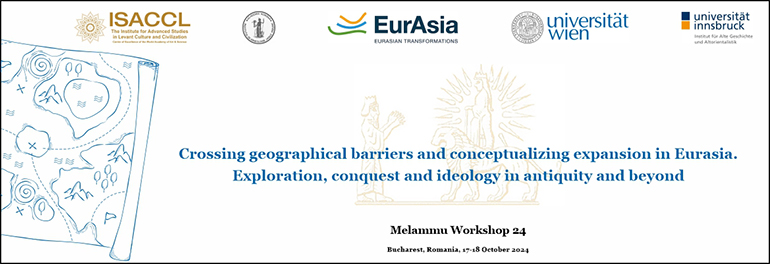Crossing geographical barriers and conceptualizing expansion in Eurasia. Exploration, conquest and ideology in antiquity and beyond
Twentyfourth Workshop of the Melammu Project
Bukarest
17-18 October 2024
Organiser: Liviu Iancu
The workshop on the webpage of
The Institute for Advanced Studies in Levant Culture and Civilization.
|
Mountains, seas, rivers, forests, deserts and swamps created barriers that separated human communities in the distant and even more recent past. Major geographical obstacles not only determined the creation and development of different cultures, economic areas and geopolitical spheres of influence but they also represented important benchmarks that stimulated the imagination, inventiveness and ability of organization and amassing resources of those individuals and groups seeking to cross them. Especially rivers and seas played an important role as markers of borders and limits of expansion, but at some point in history these borders were not accepted as natural borders anymore and they were overcome.
This workshop aims at bringing together scholars interested in expanding the understanding of how major geographical barriers and the successful (and failed) attempts to cross them shaped the history of Eurasia. Among the questions that would contribute to this end, we list just a few:
- What were the most important motivations that determined people to attempt to go across allegedly impassable or hardly passable geographical boundaries?
- How do imperial ideology and actual explorations and conquest interact?
- What was the conceptual radius of action of a given empire and how was this conceptualization translated into politics?
- What were the technical inventions and intellectual developments that made the crossing of major geographical barriers possible?
- Why were some successful crossing attempts followed by immediate and permanent developments in connectivity while others remained without any consequences?
- How did people describe and conceptualize major geographical barriers and the world beyond them before and after they were able to cross them?
- How were the crossings of major geographical obstacles portrayed in art and literature in different cultures?
The call for paper and more information on the event can be found here.
The program can be found here.
|
|
|

